
The River Tyne is a river in North East England. Its length is 73 miles (118 km). It is formed by the North Tyne and the South Tyne, which converge at Warden Rock near Hexham in Northumberland at a place dubbed 'The Meeting of the Waters'.

Coanwood is a village in Northumberland, England, and is part of the Parish of Haltwhistle. It is about four miles (6 km) to the south-west of Haltwhistle, on the South Tyne. Nearby is the village of Lambley.

Featherstone Castle, a Grade I listed building, is a large Gothic style country mansion situated on the bank of the River South Tyne about 3 miles (5 km) southwest of the town of Haltwhistle in Northumberland, England.
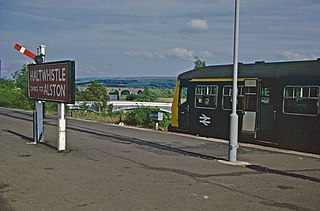
The Alston Line was a 13-mile (21 km) single-track branch line, which linked Haltwhistle in Northumberland with Alston in Cumbria.

Alston is a heritage railway station on the South Tynedale Railway. The station, situated 13 miles (21 km) south of Haltwhistle, is in the market town of Alston, Eden in Cumbria, England.

Lambley, formerly known as Harper Town, is a village and former civil parish, now in the parish of Coanwood, in Northumberland, England about four miles (6 km) southwest of Haltwhistle. The village lies adjacent to the River South Tyne. In 1951 the parish had a population of 298. The place name Lambley refers to the "pasture of lambs". Lambley used to be the site of a small convent of Benedictine Nuns, founded by Adam de Tindale and Heloise, his wife, in the 12th century. The Scots led by William Wallace devastated it in 1296 [Rowland gives 1297]. However it was restored and one William Tynedale was ordained priest to the nunnery in about 1508 – most likely not William Tyndale, the reformer, as once believed but another man of the same name. At the time of the suppression of religious houses by Henry VIII, the nunnery contained six inmates. Nothing now remains but the bell from the nunnery, which hangs in the church, and a few carved stones. The village lies in the Midgeholme Coalfield and there are reserves of good-quality coal remaining.

The Tyne Valley Line is a 58-mile (93 km) route, linking Newcastle upon Tyne with Hexham and Carlisle. The line follows the course of the River Tyne through Tyne and Wear and Northumberland. Five stations and two viaducts on the route are listed structures.

The Princess of Wales Bridge is a dual carriageway road bridge carrying the Teesdale Boulevard across the River Tees in Stockton-on-Tees in the Northeast of England. The bridge links on the south bank of the river, Teesdale Business Park in Thornaby-on-Tees to the north bank at the north end of Riverside Road at a gyratory system in Stockton-on-Tees. The bridge is sometimes referred to as the Diana Bridge or the Princess Diana Bridge, named after the late Diana, Princess of Wales. The bridge is located down river of, and just outside Stockton town centre.
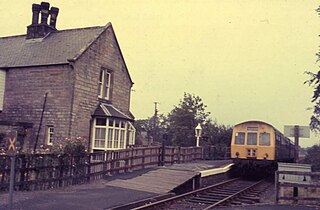
Featherstone Park was a railway station on the Alston Branch Line, which ran between Haltwhistle and Alston. The station, situated 3 miles (5 km) south-west of Haltwhistle, served the villages of Featherstone and Rowfoot in Northumberland.

Lambley was a railway station on the Alston Branch Line, which ran between Haltwhistle and Alston. The station, situated 4+3⁄4 miles (8 km) south-west of Haltwhistle, served the village of Lambley in Northumberland.

The Newcastle & Carlisle Railway (N&CR) was an English railway company formed in 1825 that built a line from Newcastle upon Tyne on Britain's east coast, to Carlisle, on the west coast. The railway began operating mineral trains in 1834 between Blaydon and Hexham, and passengers were carried for the first time the following year. The rest of the line opened in stages, completing a through route between Carlisle and Gateshead, south of the River Tyne in 1837. The directors repeatedly changed their intentions for the route at the eastern end of the line, but finally a line was opened from Scotswood to a Newcastle terminal in 1839. That line was extended twice, reaching Newcastle Central station in 1851.
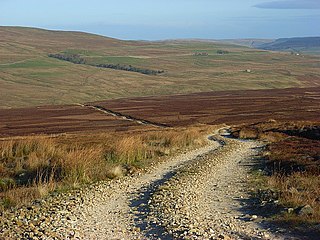
The Maiden Way or Maidenway was a roughly 20-mile (32 km) Roman road in northern Britain connecting the Roman fort of Bravoniacum near Penrith with that of Magnae (Carvoran) on Hadrian's Wall, via the intermediate fort of Epiacum roughly half-way between the two. The Maiden Way was sometimes considered also to have run east along the Stanegate to Banna (Birdoswald), then 7 miles (11 km) north to the Shrine of Cocidius (Bewcastle), and thence to Liddesdale, but the zig-zag identity of this course as a single road is problematic.

Lambley Viaduct is a stone bridge across the River South Tyne at Lambley in Northumberland. Formerly a railway bridge, it remains open to pedestrians but one end of the viaduct has been fenced off.

Bellister Bridge is a concrete bridge across the River South Tyne at Haltwhistle in Northumberland, England.

Featherstone Castle Footbridge is a wooden-decked girder bridge across the River South Tyne at Featherstone Castle in Northumberland.
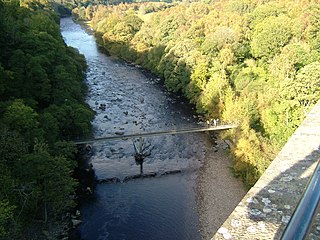
Lambley Footbridge is a wooden bridge across the River South Tyne at Lambley in Northumberland.

North Wylam railway station served the village of Wylam, Northumberland, England from 1876 to 1968 on the Tyne Valley Line.

Coanwood was a railway station on the Alston Branch Line, which ran between Haltwhistle and Alston. The station, situated 4 miles (6 km) south-west of Haltwhistle, served the village of Coanwood in Northumberland.
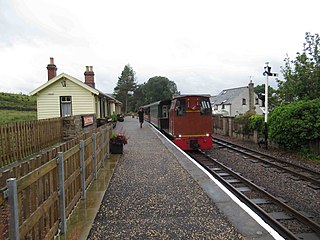
Slaggyford was a railway station on the Alston Line, which ran between Haltwhistle and Alston. The station served the village of Slaggyford in Northumberland.



















